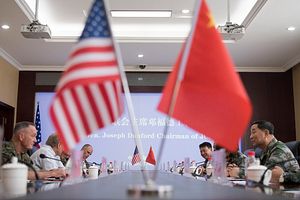On November 14 — days after U.S. President Donald Trump’s trip to Beijing — the Center for Strategic and International Studies (CSIS), one of the most prominent U.S. think tanks based in Washington D.C., held a debate on the proposition of “a growing risk of war between the U.S. and China.”
Graham Allison (a Harvard University professor and author of the book Destined for War: Can America and China Escape Thucydides’s Trap?) was for the proposition and Evan Medeiros (managing director for Asia of Eurasia Group) was against it. When the debate ended, 51 percent of the audience voted their agreement with the proposition that the United States and China are moving toward war. Actually before the debate even started, 40 percent of the audience had already expressed their support for that argument.
Despite the small sample, the stunning result still hinted at a disturbing reality: a group of Americans, including some policy pundits, firmly believe that China and the United States are going to go to war, because of the so-called “Thucydides’s Trap” — a theory, created and popularized by Allison, that claims war is the most likely result when a rising power confronts an established power.
However, China has made it clear numerous times that it really doesn’t want to go to war or have any serious friction with the United States. Beijing’s recent behavior during Trump’s trip in Beijing as well as during the APEC and the ASEAN summits once again demonstrated China’s strong intention to avoid conflict with the sole superpower in today’s world.
As The Diplomat reported earlier, during Trump’s trip in Beijing, Chinese President Xi Jinping broke a series of Chinese protocol traditions just to provide Trump an emperor-style “state visit-plus” treatment. Not only Trump himself, but also his wife Melania Trump received the highest-level treatment in China. Melania was so satisfied with her grand treatment in China that she not only extended her stay in Beijing after her husband left for his next destination, but repeatedly posted Vogue-style photos shot in Beijing on her Twitter account. In fact, on China’s end, at the last minute Beijing closed two of the most popular area tourist attractions just to let Melania enjoy private super-VIP moments with pandas in the Beijing Zoo and on the Great Wall.
Economically, China also signed record-breaking multi-billion-dollar deals with the United States. Even if some analysts doubt the future actual delivery of these signed contracts, China’s intention to please Trump and fulfill his political agenda was unquestionable.
By exhausting the whole city’s resources to charm Trump and his wife, Xi has sent a clear message to the United States: China doesn’t want to have a trade war or any other war with America. As Xi said during Trump’s latest visit, as well as on many other occasions, “cooperation is the only correct choice” between the two nations.
During the recently closed Asia-Pacific Economic Cooperation (APEC) summit held in Vietnam and the Association of Southeast Asian Nations (ASEAN) summit held in the Philippines, China once again showed its strong intention to settle disputes with its neighbors, including some U.S. allies. As The Diplomat reported, China has promised the Asia-Pacific countries that it will “stick to the path of peaceful development,” agreed to resolve differences over the South China Sea with the Philippines, issued a joint statement and reached a consensus with Vietnam, and tried to achieve a rapprochement with Japan.
As for one of the most critical issues between China and the United States, the North Korean crisis, China announced it would send a special envoy to North Korea — which won Trump’s Twitter compliments In fact, Xi straightforwardly said it earlier that China’s bottom line for the North Korean issue is “no war, no crisis, no nuclearization.”
Besides the latest developments mentioned above, it’s also worth keeping in mind that foreign policy is the extension of domestic policy. For China’s ruling party, the Chinese Communist Party (CCP), the top priorities are always maintaining national stability, boosting the country’s economy, avoiding foreseeable and even unpredictable crises, and solving China’s domestic problems, so as to maintain “socialism with Chinese characteristics.” Under these preconditions, a war with the United States would absolutely be the last thing the CCP wants.

































